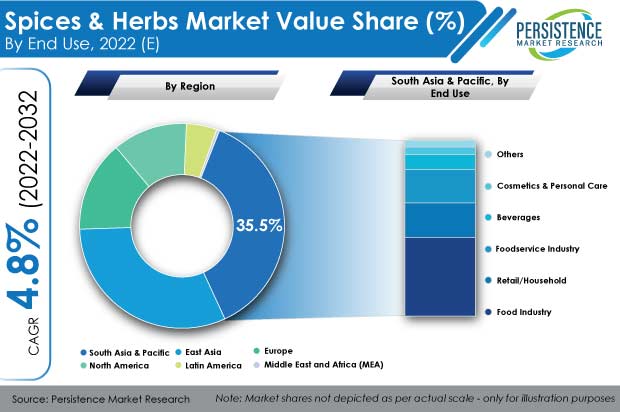Spices and Herbs Market Segmented By Spices and Herbs in Organic and Conventional Nature in Whole, powder and oil Form
Industry: Food and Beverages
Published Date: January-2022
Format: PPT*, PDF, EXCEL
Delivery Timelines: Contact Sales
Number of Pages: 418
Report ID: PMRREP31925
The global spices and herbs market is currently valued at US$ 79.1 Bn, and is anticipated to progress at a value CAGR of 4.8% to register a valuation of US$ 126 Bn by 2032.
| Attribute | Key Insights |
|---|---|
|
Spices and Herbs Market Size (2022E) |
US$ 79.1 Bn |
|
Projected Sales of Spices and Herbs (2032F) |
US$ 126 Bn |
|
Value CAGR (2022-2032) |
4.8% |
|
Value Share of Top 5 Countries (2021A) |
72.6% |
The South Asia spices and herbs market currently dominates the global landscape with a value share of over 35%, and is anticipated to top US$ 45 Bn by 2032.
The global market for spice and herbs expanded at a CAGR of 4.8% during 2017-2021. Increasing health consciousness among consumers along with rising interest in exotic flavours is driving demand for organic spice and herbs. The millennial population is fascinated by different types of cuisines and flavours that vary according to the culture specific to their regions.
Salts and herbs offer consumers numerous health benefits such as lowering blood sugar levels, improving brain functioning, boosting immunity, having anti-inflammatory properties, and many more. Additionally, spices and herbs are also a rich source of essential vitamins and minerals, which makes them a crucial food ingredient for creating various dishes that taste good and improve health as well. These food ingredients also impart aroma, flavor, and colour to the foods.
The global spices and herbs market is expected to expand at a value CAGR of 4.8% through 2032.

“Numerous Health Benefits of Spices and Seasonings Driving Demand”
The foodservice industry is anticipated to expand with a value CAGR 5.3% due to factors such as increased preference for novel food products and rising disposable income.
The foodservice business has seen enormous expansion over the last decade. Consumers' preferences are influenced by a number of variables, including their busy lifestyles and the growing working population. Changes in customer preferences, purchasing patterns, and behaviors have also contributed to a greater desire for restaurant-prepared cuisines.
This has provided new opportunities for food and ingredient manufacturers. Spices and herbs are also an example of adaptable food ingredients, as they can be used in a variety of ways. Various spices and herbs are used in seasonings, flavorings, salad dressings, beverage formulas, and many more across the foodservice industry.
Furthermore, the numerous health benefits linked with spices and herbs have made them a necessary ingredient for foodservice operators because of the appeal to health-conscious customers. There are some spices such as fenugreek that are used to enhance the texture of food as well.
As a result, the market for spice and herb extracts is growing steadily, which will also have a positive impact on the food flavor market.
Many top manufacturers of organic spices and herbs are focusing on product development in order to provide customers with added functionalities. These product development and expansion capabilities helps companies come up with new salts and herbs to cater to the growing needs of consumers.
“Rising Demand for Spice and Herb Extracts for Use in Supplements”
Spices and herbs are widely utilized in the food & beverage business as a flavoring, coloring, and aromatic ingredients. These culinary ingredients are becoming increasingly popular as a result of their numerous applications.
A plethora of continuing research focuses on the health benefits of vitamins and minerals, as well as various types of nutrition, and have been published in major scientific journals. Due to changes in lifestyle and eating habits, consumers around the world are failing to meet the recommended levels of nutrients and vitamins, leading in an increase in the use of dietary supplements.
Due to their health benefits and nutritional properties, spices and herbs are employed in the nutraceutical industry for a number of applications. Basil has anti-diarrheal properties. Cardamom is a spice that promotes digestion and absorption as well as reducing congestion. Garlic is an antibiotic that is antibacterial, antifungal, and anti-parasitic.
As a result, nutraceutical businesses are increasingly including spices and herbs in dietary supplements to provide natural health benefits to consumers. Spice and herb extract producers are anticipated to benefit from this development.
“Rising Application of Spices and Herbs in Cosmetics & Personal Care Products”
By 2032, global value of the cosmetics and personal care market is estimated to cross US$ 5.5 Bn. Herbs and spices have been used to maintain and enhance human beauty for thousands of years. Indian and Chinese cuisines have long been associated with the use of spices and herbs for a variety of purposes. Women in these areas have used turmeric and sandal wood for skincare, as well as various spices for scents, among others.
Consumer spending on cosmetics and personal care is on the rise, as buyers strive for a presentable and fashionable appearance. Natural ingredients are being used by beauty product producers, cosmetic ODMs, and contract manufacturers to provide benefits to consumers without any negative effects. Herbs and spices, as natural substances, are in high demand.
Calendula is used for repairing dry skin and reducing acne, nutmeg is used for its antiseptic properties, ginger aids in the appearance of a refreshed and radiant appearance, basil oil is used to reduce roughness and moisturize the skin, and cinnamon oil is used in creams for its blemish-eliminating property.
Cosmetic chemists are being compelled by the 'Clean Beauty' and 'Green Beauty' trends to incorporate more natural components into new formulations. As a result, manufacturers of spices and herbs will have greater options to sell their products on a global scale.
“Adulteration of Spices and Seasonings Major Headache for Market Players”
Despite the fact that botanicals are becoming increasingly popular, increased adulteration and lack of tight regulations are posing a danger to the global spices and herbs sector. With rising demand for spices and herbs in the food and beverage business, adulteration of these commodities is becoming more common.
Furthermore, high manufacturing costs of spices and herbs, especially organic spices and herbs would function as a stumbling block to market growth. Majority of spices and herbs are grown in developing countries such as India and China. This production necessitates a significant amount of processing power and is a labour-intensive activity, making it costly.
Wide price swings are frequently caused by lack of processing processes, dearth of testing facilities at procurement and trade centres, and unscrupulous market management, all affecting market expansion.
Who is Leading the Spices and Herbs Market in the Asian Region?
The market for spices and herbs is witnessing significant growth in India at a value CAGR 4.8%. Demand growth of spices and herbs in the South Asian region is rising at a significant rate, which provides a favourable market growth opportunity for spice and herb producers in India. Also, there is high demand for oregano masala, origanum spices, and oregano powder in India.
Which Country is Prominent in the East Asia Market?
China holds a major share in the East Asia spices and herbs market. This is due to the growing health and nutritional benefits of spices and herbs being seen by consumers. Market value CAGR of China is slated to be around 4% through 2032.
Which Type of Spices and Herbs is Most Popular in the World?
Based on type, garlic spice is mostly demanded and consumed in the spices and herbs category. Market value share of garlic is 31.5%. Demand for garlic in the food industry is high owing to its popularity among consumers and due to the perceived health benefits.
Which Distribution Channel is Offering New Opportunity for Suppliers of Spices and Herbs?
Market value of spices and herbs in the business-to-business distribution channel category is expected to reach US$ 95.6 Bn by the end of the forecast period. Business to business sales of spices and herbs is leading market progress across geographies.
Major manufacturers of spices and herbs are their existing capacity of production. Leading market players such as McCormick & Company, Inc. and DF World of Spices GmbH are focused on partnerships to launch new products. Several key players are also investing in research & development to innovate and come up with new functionalities of spices and herbs.
| Attribute | Details |
|---|---|
|
Forecast period |
2022-2032 |
|
Historical data available for |
2017-2021 |
|
Market analysis |
US$ million for value |
|
Key regions covered |
|
|
Key countries covered |
|
|
Key market segments covered |
|
|
Key companies profiled |
|
|
Report coverage |
|
|
Customization & pricing |
Available upon request |
Spices and Herbs Market by Product:
Spices and Herbs Market by Nature:
Spices and Herbs Market by Form:
Spices and Herbs Market by End Use:
Spices and Herbs Market by Distribution Channel:
Spices and Herbs Market by Region:
To know more about delivery timeline for this report Contact Sales

The global spices and herbs market is currently valued at over US$ 79 Bn.
The global spices and herbs industry is currently led by Asia.
Increasing demand for healthy and savory food, growing utilization in foodservice industry, and increased demand in North America to drive market growth.
From 2016 to 2020, demand for spices and herbs increased at a CAGR of 4.3%.
Sales of spices and herbs are projected to increase at 4.8% CAGR and be valued at over US$ 126 Bn by 2031.
The top 5 manufacturers of spices and herbs include McCormick & Company, Inc., Paulig Group, Mahashian Di Hatti Pvt. Ltd., Koninklijke Euroma, and DF World of Spices GmbH BV, with a market share of 5%-15%.
The main country in Europe with highest share is Russia (28.9%), followed by Spain.
The Japan spices and herbs market is anticipated to reach US$ 846.8 Mn by 2032, while that in Canada is set to reach US$ 2.5 Bn.